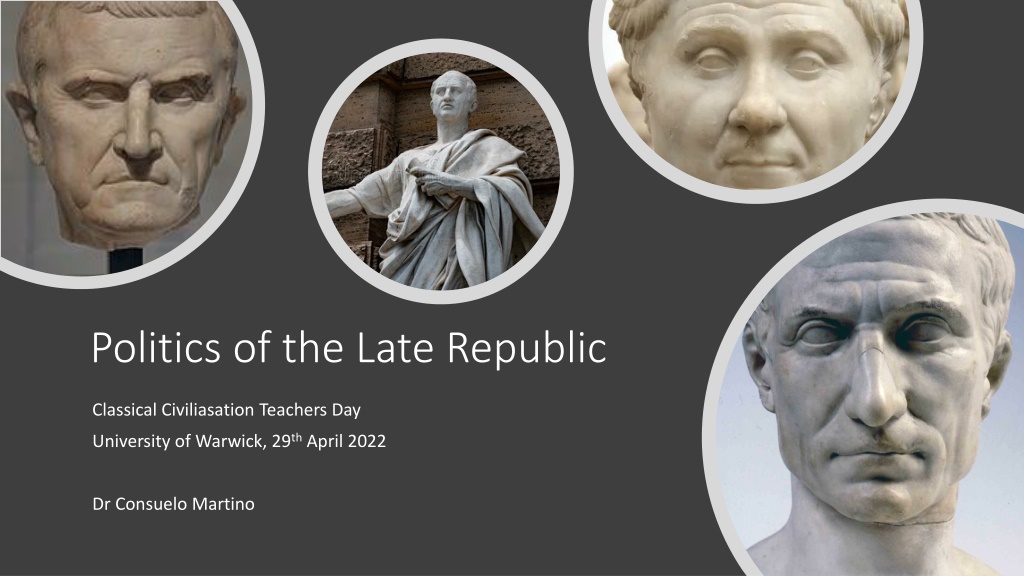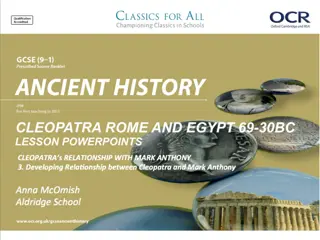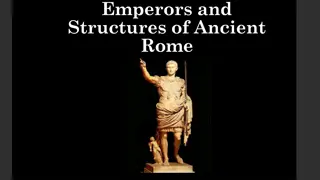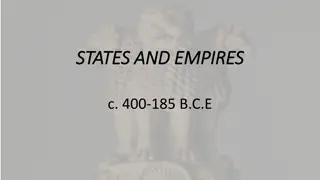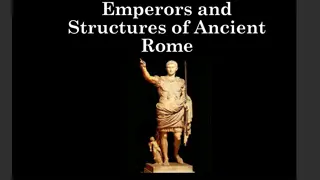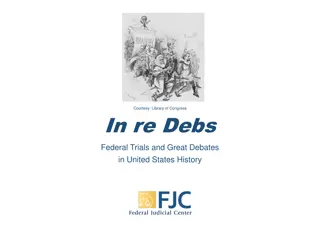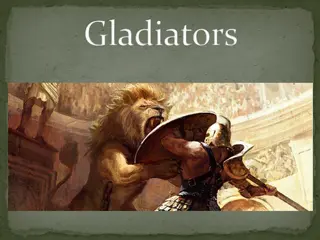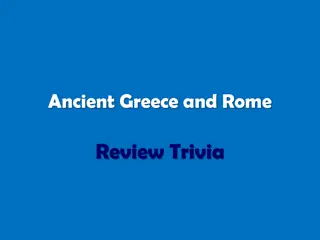Political Unrest and Power Struggles in Ancient Rome
In the Late Republic of Rome, conflicts between the plebeians and the Senate often led to internal discord and power struggles. The tensions escalated over time, culminating in instances of armed strife and civil war. Leaders like Marcius Coriolanus and Tiberius Gracchus played significant roles in these tumultuous events, leading to a period of violence, insurrections, and betrayal. The political landscape was marked by brutal confrontations, disregard for law and justice, and the rise of factions vying for supreme power.
Download Presentation

Please find below an Image/Link to download the presentation.
The content on the website is provided AS IS for your information and personal use only. It may not be sold, licensed, or shared on other websites without obtaining consent from the author. Download presentation by click this link. If you encounter any issues during the download, it is possible that the publisher has removed the file from their server.
E N D
Presentation Transcript
Politics of the Late Republic Classical Civiliasation Teachers Day University of Warwick, 29thApril 2022 Dr Consuelo Martino
The plebeians and Senate of Rome were often at strife with each other concerning the enactment of laws, the cancelling of debts, the division of lands, or the election of magistrates. Internal discord did not, however, bring them to blows; there were dissensions merely and contests within the limits of the law, which they composed by making mutual concessions, and with much respect for each other. Once when the plebeians were entering on a campaign they fell into a controversy of the sort, but they did not use the weapons in their hands, but withdrew to the hill, which from that time on was called the Sacred Mount (Secessio of the plebs 494 BC). Even then no violence was done, but they created a magistrate for their protection and called him the Tribune of the Plebs, to serve especially as a check upon the consuls, who were chosen by the Senate, so that political power should not be exclusively in their hands. From this arose still greater bitterness, and the magistrates were arrayed in stronger animosity to each other from this time on, and the Senate and plebeians took sides with them, each believing that it would prevail over the other by augmenting the power of its own magistrates. It was in the midst of contests of this kind that Marcius Coriolanus (5thcent. BC), having been banished contrary to justice, took refuge with the Volsci and levied war against his country. (App. BC 1.1)
133-21 BC: Tiberius and Caius Gracchus Considered the start of the civil war period by later historian Appian (2ndCent. AD) This is the only case of armed strife that can be found in the ancient seditions, and this was caused by an exile. The sword was never carried into the assembly, and there was no civil butchery until Tiberius Gracchus, while serving as a tribune and bringing forward new laws, was the first to fall a victim to internal commotion; and with him many others, who were crowded together at the Capitol round the temple, were also slain. Sedition did not end with this abominable deed. Repeatedly the parties came into open conflict, often carrying daggers; and from time to time in the temples, or the assemblies, or the forum, some tribune, or praetor, or consul, or candidate for these offices, or some person otherwise distinguished, would be slain. Unseemly violence prevailed almost constantly, together with shameful contempt for law and justice. As the evil gained in magnitude open insurrections against the government and large warlike expeditions against their country were undertaken by exiles, or criminals, or persons contending against each other for some office or military command. There arose chiefs of factions quite frequently, aspiring to supreme power, some of them refusing to disband the troops entrusted to them by the people, others even hiring forces against each other on their own account, without public authority. Whenever either side first got possession of the city, the opposition party made war nominally against their own adversaries, but actually against their country. They assailed it like an enemy's capital, and ruthless and indiscriminate massacres of citizens were perpetrated. Some were proscribed, others banished, property was confiscated, and prisoners were even subjected to excruciating tortures. (App. BC 1.2)
The bodies of Caius and Fulvius and of the other slain were thrown into the Tiber, and they numbered three thousand; their property was sold and the proceeds paid into the public treasury. [ ] However, what vexed the people more than this or anything else was the erection of a temple of Concord by Opimius; for it was felt that he was priding himself and exulting and in a manner celebrating a triumph in view of all this slaughter of citizens. Therefore at night, beneath the inscription on the temple, somebody carved this verse: "A work of mad discord produces a temple of Concord. (Plut. C. Gr. 17.5-6)
The end of the Roman republic: main events (all dates B.C. unless highlighted) 133 Tribunate and Death of Tiberius Gracchus ( > attempts to agrarian reforms) 121 Tribunate and Death of Gaius Gracchus 107, 104, 103, 102, 101, 100, 86 > seven consulship of Gaius Marius 112-104 War against Jugurtha (cf. Sallust Bellum Iugurthinum) 113-101 Cimbrian wars Military reforms: recruit destitute men > loyalty to the general more than to the Republic 91-89 Social war (war with the Italian allies) 88-82 First civil war (Marius vs. L. Cornelius Sulla) 87 Cinna and Marius execute senators; 86 death of Marius 82 Sulla wins at Collina Gate > first round of proscriptions; Sulla dictator for life
The end of the Roman republic: main events (all dates B.C. unless highlighted) 78 Sulla retires from public life and returns the power to the Senate; dies on the same year. 70 Pompey and Crassus consuls 66-63 Third Mithridatic war 69 Julius Caesar (=JC) quaestor 65 JC aedile 60 First Triumvirate (JC, Pompey, Crassus) 59 JC consul 53 Battle of Carrhae > defeat of Crassus against the Parthians 58-49 JC Proconsul in the Gauls (Gallic Wars) 49-45 Civil War (JC vs. Pompey and the Senate) 48 Battle of Pharsalus > Defeat of Pompey; fled to Egypt and is killed by Achilla, Ptolemy s man; JC starts a war against Egypt which end with Cleopatra as queen (Bellum Alexandrinum) 46 Tapsus > Defeat of Cato, Scipio, Juba (all commits suicide) 45 Munda > Defeat of Pompey s sons (Cnaeus dies; Sextus does not)
The Trial against Verres (70 BC) 73-71 BC Verres propraetor in Sicily 70 BC Trial Officially: Quaestio de pecuniis repetundis, the (court of) inquiry into moneys claimed back but the case was, in fact, a criminal prosecution for general misgovernment and oppression 20 January > Divinatio in Caecilium In case of more than one delator, a panel would meet and decide who had the best reasons to prosecute. Cicero vs. Caecilium (backed by Hortensius) January April > Cicero collects testimonies about Verres (only 110 days) 14-26 July > Choice of the jurors 5 August > I oratio in Verrem 7 August > Verres flees Rome and the trial 4-19 September > self-exile of Verres
Extortion Courts (de repetundis) Re-constituted by Tiberius Gracchus Membership reserved to equestrian order Sulla (82-78): more senatorial view > membership of the Extortion Court, as of the new criminal courts which he instituted, was confined to senators. This was already at risk in 70 BC when the popularis faction and the tribunes regained power. Cicero addressed the senatorial Extortion Court as the prosecutor of Verres: a bill was already promulgated providing that membership of the criminal courts, the Extortion Court included, was no longer to be the monopoly of senators, who were only to constitute one-third of the whole.
The importance of public opinion Roman politicians had to be skilled in dealing with public opinion, to appease it, to scorn it, ignore it, deny it, or encourage it. The importance of public opinion in politics meant that Roman rhetoricians treated it in their handbooks, and trained their students and readers on how to use it and deal with it (Rosillo-Lopez 2017:196) The exordium is, then, divided into two species, introduction and insinuation. An introduction is an address which directly and in plain language makes the auditor well-disposed, receptive, and attentive. Insinuation is an address which by dissimulation and indirection unobtrusively steals into the mind of the auditor. In the difficult case, if the auditors are not completely hostile, it will be permissible to try to win their goodwill by an introduction; if they are violently opposed it will be necessary to have recourse to the insinuation. For if amity and good-will are sought from auditors who are in a rage, not only is the desired result not obtained, but their hatred is increased and fanned into a flame. Cic. Inv. 1.20
The narrative will be plausible if it seems to embody characteristics which are accustomed to appear in real life; if the proper qualities of the character are maintained, if reasons for their actions are plain, if there seems to have been ability to do the deed, if it can be shown that the time was opportune, the space sufficient and the place suitable for the events about to be narrated; if the story fits in with the nature of the actors in it, the habits of ordinary people and the beliefs of the audience. Cic. Inv. 1.29
Ciceros strategy against Verres and public opinion Cicero s strategy founded on four key points: 1. Verres would use bribes to be acquitted 2. Verres would be acquitted because he was a senator 3. Public opinion wanted Verres condemnation 4. In case of acquittal, judges would fall into public disdain and lose their authority over tribunals Arguments addressed to three different groups of public opinion: Judges People Senators
Ciceros strategy against Verres and public opinion: Verres would use bribes to be acquitted And I see clearly the circumstances for which he hopes, and upon what his mind is fixed. But how he truly believes that he is able to accomplish anything with the current praetor and this bench of judges, I cannot understand. This one thing I do know (which the Roman people also realised when he rejected the judges) is that he had this hope: that he would place all his chances of safety in money and if this defence was taken from him, he thought nothing would help him. (Cic. Verr. 1.10)
Ciceros strategy against Verres and public opinion: Verres would be acquitted because he was a senator But now men are on the watchtowers; they are observing how each one of us behaves in respecting religion and keeping the laws. They see that so far, since the passing of the law to restore power to the tribunes, only one Senator (and a most feeble one at that) has been condemned. Although they do not blame this, they do not have anything they can praise much either. For there is no praise for being upright and just in a case where there is no one who can, or is even trying, to corrupt it. (Cic. Verr. 1.46) Manipulation of facts: during that period, FOUR senators had been condemned (among whom, Cn. Cornelius Dolabella in 78 BC)
Ciceros strategy against Verres and public opinion: public opinion wanted Verres condemnation Now, in this time of crisis for your order and your judgements, when there are men prepared to try to kindle the unpopularity of the Senate even further with speeches and the proposal of new laws, Gaius Verres has been brought to trial as a criminal. He is a man already condemned in everyone s opinion by his life and actions, yet acquitted by the magnitude of his wealth, according to his own hope and public boast. I have undertaken this case as prosecutor, O Judges, with the greatest good will and expectation of the Roman people; not so that I might increase the unpopularity of the Senate, but so that I might relieve it from the dishonour which I share with it. For I have brought a man before you whose case will enable you to restore the lost reputation of your courts, return to favour with the people of Rome, and satisfy foreign nations: a man, the embezzler of public funds, the abuser of Asia and Pamphyliae, the thief of the city s rights, and the shame and ruin of the province of Sicily. (Cic. In Verr. 1.2)
Ciceros strategy against Verres and public opinion: public opinion wanted Verres condemnation Neither the anticipation of my prosecution, nor an assembly of this great size (although I am greatly disturbed by these circumstances) influences me so much as that man s wicked plans, which he endeavours to plot simultaneously against me, against you, Manius Glabrio, and against the Roman people; he plots against the allies, against foreign nations, against the Senate and against the very name of Senator; the man who frequently says that he who has only stolen enough for himself should be afraid, but this man has stolen enough to satisfy everyone; nothing is so holy that it cannot be corrupted, nor anything so fortified that it cannot be conquered by money (Cic. In Verr. 1.4)
Ciceros strategy against Verres and public opinion: public opinion wanted Verres condemnation But surely these crimes were committed by him in such a way that they would not be known to all men? I think that there is no man who, upon hearing his name, is not also able to relate his evil deeds; thus I ought to be more afraid of being thought to omit many of his crimes rather than inventing any charges against him. Indeed, it does not seem to me that this crowd, which has assembled to hear this case, wishes to learn the facts from me, but rather wishes to refresh its memory of what it already knows. Since this is the case, that insane and corrupt man seeks another form of combat with me. He does not conduct the trial so that he would oppose anyone s eloquence for me; he depends upon nobody s influence, authority, or political power. He is pretending that he trusts these things but I see what he is really doing (for he is not exactly acting inconspicuously); he places empty titles of nobility before me, that is, the names of arrogant men who do not hinder me so much by being noble as they help me by being notorious. He pretends that he relies on their protection, when in the meantime he is devising some other plan, and has been doing so for a long time now. (Cic. Verr. 1.15)
Ciceros strategy against Verres and public opinion: in case of acquittal, judges would fall into public disdain and lose their authority over tribunals The thing which was desired most of all, O Judges, and which alone was thought to be the foremost factor in allaying the unpopularity of your order and the dishonour of the courts, seems, at this crucial time for the Republic, to have been offered to and bestowed upon you; not by human counsel, but almost by divine influence. For now, a belief has become established, which is both destructive for the Republic, and dangerous for you. The rumour is spreading, not only among the Roman people, but also among foreign nations, that in these courts as they exist now, no wealthy man, however guilty he may be, can possibly be convicted. (Cic. Verr. 1.1)
Ciceros strategy against Verres and public opinion: in case of acquittal, judges would fall into public disdain and lose their authority over tribunals Cicero evoked Pompey s first speech as consul-elect that threatened the Senatorial control of the tribunals: Finally, Gnaeus Pompeius himself, during the first speech he gave to the city as consul elect, made it clear that he would restore the power of the tribunes (which seemed to be greatly anticipated). At this point, a shout was heard and a grateful murmur spread throughout the assembly. And, when the same man had said in the same assembly that the provinces were plundered and plagued; that the law courts had become disgraceful and wicked; and that he wished to look into and make provisions for this situation; then indeed the Roman people showed their assent not with a shout, but with the greatest uproar (Cic. Verr. 1.45) People favoured Pompey s measures > reinforce the idea of popular hostility towards extortion Cicero underlined in the speech Extortion is a everybody s problem, not just for the foreigners (=the Sicilians) > Roman citizens became accusers
Ciceros strategy against Verres and public opinion: in case of acquittal, judges would fall into public disdain and lose their authority over tribunals More accusations no equites had been convicted of corruption while they composed the juries (Verr. 1.37-41) Belief that senators were more easily bribed By condemning Verres they were restoring prestige to senatorial courts Cicero manipulated the judges fear: the return of the equites to the permanent trial This would in fact happen later that year with the lex Aurelia iudiciaria > mixed tribunals composed by senators, equites and tribunes of the treasure (until 46 BC)
He would not despise and scorn the Senatorial order to such an extent that, by his will, one of its members would be chosen to be held as a criminal who must plead his case before Manius Glabrio while, in the meantime, this man was preparing whatever he needed. (Verr. 1.9) Since the whole Senate is being pressured by the wickedness and audacity of a few, and is being threatened by the infamy of the courts, I profess that as a prosecutor, I am an enemy to this type of man; a harsh and unrelenting adversary who is to be hated (Verr. 1.36)
This is a trial in which you will be judging the defendant, and the Roman people will be judging you. In the case of this man, it will be established whether very guilty and very rich men are able to be condemned when Senators are acting as judges. Moreover, he is a criminal of such a sort, that there is nothing in his character except for the worst crimes and excessive riches. Thus, if he is acquitted, no other opinion of him will be held except that which is most shameful. Such numerous and terrible vices will not be seen to be lessened by influence, by family, by some things being done correctly or even by some other tolerable vice. [ ] You are now able to remove and destroy the shame and infamy which, over the years, have been attached to your order. It is understood among all men, that since these trials which we now have were established, there is yet to have been a jury of this splendour and this dignity. But if anything here is to be done incorrectly, all men will think not that other more suitable judges should be appointed from that same order (which is impossible) but that another order entirely must be established for administering judicial affairs. (Verr. 1.47-49)
Ciceros rising star: 70-63 BC 70 BC > victory over Hortensius in the trial of Verres 69 BC > Edile 66 BC > Praetor Pro Cluentio 63 BC > Consul Conspiracy of Catiline (November-December) Four speeches against Catiline (8 November: first Catilinarian speech) Condemnation of Roman citizens involved without trial > very controversial This act will lead to Cicero s condemnation in 58 BC (Lex Clodia de Civibus Romanis Interemptis) 51 BC > proconsul in Cilicia
Cicero & his Friends Pomponius Atticus Quintus Cicero (brother) M. Caelius Rufus Curio the Elder Pompey Caesar C. Caesar Octavianus
I did expect some congratulation in your letter on my achievements, both for the sake of the ties between us and that of the Republic. This I presume to have been omitted by you for fear of hurting anyone s feelings. But let me tell you; what I did for the salvation of the country is approved by the judgement and testimony of the whole world. When you return home, you will know the great wisdom and courage I showed, and you a much greater man than Africanus was will find it easy to admit me one who is not much inferior to Laelius into association in politics and friendship. (Cic. Fam. 5.7)
The Republic in danger Would you have ever thought it possible that my words would fail me, and not only the oratorical sort, but common vernacular language? They do fail me, and for this reason: I am extraordinarily anxious about what will be decided about the provinces. (Fam. 2.11 to Caelius; 4th April 50 BC)
On the edge of the war: Att. 7.9 (Dec 50) The possibilities are as follows: (1) Caesar s candidature may be admitted while he still retains his army either by favour of the Senate or of the Tribunes. (2) Caesar may be persuaded to hand over his province and army and so become Consul. (3) If he be not so persuaded, elections may be held without admission of his candidature, he not obstructing and meanwhile retaining his province. (4) Should he obstruct this by means of Tribunes but not resort to violence, there will be an interregnum. (5) If he brings up his army because his candidature is not accepted we must fight him. Now he may begin military operations (a) at once, before we are properly ready, or (b) at the elections, when his friends demand that his candidature be admitted according to the law and the demand is rejected. Further he may resort to arms either (a) on the single pretext of the rejection of his candidature or (b) on some additional pretext, if it should happen that a Tribune obstructing the Senate or stirring up the people and being censured or curtailed in his functions by senatorial decree or removed
On the edge of the war: Att. 7.9 (Dec 50) [cont.] from office or expelled or claiming to have been expelled should take refuge with him. War once begun, either (a) Rome would have to be held or (b) Rome would have to be abandoned and Caesar cut off from his supplies and his remaining forces. Of these evils, one of which is inevitable, which do you consider the least? No doubt you will say that he be persuaded to hand over his army and so become Consul. True, this would be a course against which, if he were to bring himself to it, nothing could be said, and I am surprised that he does not do so if his claim to stand while retaining his army is not allowed. From our standpoint however, as certain persons think, no prospect is more formidable than Caesar as Consul. Better thus you will say, than with an army at his back. Assuredly, but this very thus is considered a disaster by somebody; and yet there is no help for it. If that is what he wants we must let him have it. You have put up with him as Consul before, put up with him again. Ah, but he was weak then comes the answer, and yet stronger than the entire state. What do you think he will be like now?
Caesar requested a second consulship in absentia > denied 7 Jan 49 BC > s.c. ultimum against Caesar The tribunes (Mark Antony and Crassus) together with Caesarians leave the city New meetings of the Senate outside Rome (8-12 Jan 49) End of Caesar s command in Gaul resolved Caesar lost privileges concerning his candidacy to a second consulship L. Domitius Ahenobarbus nominated proconsul in Gallia Transalpina with 4000 soldiers (ca. one legion; Caesar had 11 under his command) Pompey tasked to recruit an army of 130000 soldiers Italy divided into districts to collect contributions Provinces distributed Night of January 10/11 > Caesar crosses the Rubicon January 17 > Caesarian troops already won Ariminum, Pisaurum, Ancona and Arretium (Cic. Fam. 16.12.2, Att. 7.11.1; Caes. BCiv. 1.11.4) Pompey and the Senate flee to Greece
Caesars position: Att. 9.7c (to Oppius and Balbus, ca. 5thMarch 49) I am indeed glad that you express in your letter such hearty approval of the proceedings at Corfinium. I shall willingly follow your advice, all the more willingly because I had of my own accord decided to show all possible clemency and to do my best to reconcile Pompey. Let us try whether by this means we can win back the good will of all and enjoy a lasting victory, seeing that others have not managed by cruelty to escape hatred or to make their victories endure, except only L. Sulla, whom I do not propose to imitate. Let this be the new style of conquest, to make mercy and generosity our shield. As to how that is to be done, certain possibilities occur to me and many more can be found. I request you to apply your thoughts to these matters. I captured N. Magius, Pompey s Prefect. Naturally I followed my set practice and immediately discharged him.Two Prefects of Engineers of Pompey s have now fallen into my hands and been released by me. If they wish to show themselves grateful they should urge Pompey to prefer my friendship to that of those who have always been his and my bitter enemies, by whose machinations the country has been brought to its present pass.
Ciceros disappointment: Att. 8.8 (23rdFebruary 49 BC) Oh what a dishonourable and therefore miserable thing! For I feel that misery lies mainly or solely in dishonour. He developed Caesar, then he suddenly began to fear him; he rejected all offers of peace; he made no preparations for war; he left Rome; he was to blame for the loss of Picenum; he confined himself in Apulia; he went to Greece; leaving us all without a word, or letting us in on his extraordinary plan upon which so much depended. Suddenly, a letter came to him and his Consuls from Domitius. It seemed to me to be as though the light of honour flashed from Pompey s eyes, and the real man he ought to be exclaimed: So let them scheme as they must, And attempt every trick, Yet right is on my side. But Pompey bids a long goodbye to honour, and proceeds for Brundisium. As for Domitius, they say upon hearing this, he and those with him surrendered. Oh, what a terrible business! I am too distressed to write much more I hope for your letters.
Cicero tries to mediate? Att. 9.7 (13th March 49 BC) Accordingly I shall follow your advice and stay at Formiae, so that on the one hand I shall not attract notice by welcoming him (JC)at Rome and on the other he will not think I have deliberately avoided him, if I see him neither here nor there. As for your suggestion that I ask him to allow me to pay as much regard to Pompey as I have paid to himself, you will see from Balbus and Oppius letters, copies of which I enclose, that this is what I have been doing for some time past I also enclose a letter of Caesar s to them, a sane letter so far as there can be any sanity in such madness. If however Caesar should refuse me this, I see that you are in favour of my coming forward as an advocate of peace. I do not fear the danger involved (so many hang over me that I might as well settle for the most honourable), but I am afraid of causing Pompey embarrassment and of his turning on me the Gorgon s head, monster most terrible. For our Gnaeus is marvellously covetous of despotism on Sullan lines. Experto crede; he has been as open about it as he ever was about anything. And is that the man you want to be with? Believe me, it is the obligation that moves me not the cause
Cicero tries to mediate? Att. 9.7a and 9.7b (Balbus and Oppius to Cicero, 10-11th March 49 BC) If we had learned from Caesar himself that he would do what in our judgement we think he ought to do, namely start negotiations for a reconciliation between himself and Pompey as soon as he gets to Rome, we should not cease to urge you to consent to take part in them, so that through you, who have ties with both, the whole matter might be settled with greater facility and dignity. [ ] (Att. 9.7a) Greetings. After dispatching Oppius and my joint letter I received a letter from Caesar of which I send you a copy. From it you will see how anxious he is to restore good relations with Pompey, and how far removed from any sort of cruelty. [ ] Therefore I am in favour, if you agree, of your writing to him and requesting him to provide you with a bodyguard, as you requested Pompey to do, very rightly as I thought, in the Milo period.I will guarantee, if I know Caesar, that he will think more of your position than of his own interests.
Caesars position: Att. 9.7c (to Oppius and Balbus, ca. 5thMarch 49) I am indeed glad that you express in your letter such hearty approval of the proceedings at Corfinium. I shall willingly follow your advice, all the more willingly because I had of my own accord decided to show all possible clemency and to do my best to reconcile Pompey. Let us try whether by this means we can win back the good will of all and enjoy a lasting victory, seeing that others have not managed by cruelty to escape hatred or to make their victories endure, except only L. Sulla, whom I do not propose to imitate. Let this be the new style of conquest, to make mercy and generosity our shield. As to how that is to be done, certain possibilities occur to me and many more can be found. I request you to apply your thoughts to these matters. I captured N. Magius, Pompey s Prefect. Naturally I followed my set practice and immediately discharged him.Two Prefects of Engineers of Pompey s have now fallen into my hands and been released by me. If they wish to show themselves grateful they should urge Pompey to prefer my friendship to that of those who have always been his and my bitter enemies, by whose machinations the country has been brought to its present pass.
Caesars request of collaboration (Att. 9.6a Caesar to Cicero) Though I have only just seen our friend Furnius and could neither speak nor listen to him at leisure since I am in haste and on the march with my army already sent ahead, yet I could not neglect to write to you and to send him and to express my thanks; though that I have often done and expect to do even oftener you give me so much cause. Especially I ask of you, since I have every hope of getting to Rome in the near future, to let me see you there, so that I may be able to avail myself of your advice, influence, standing, and help in all matters. To return to my point: you must forgive my haste and the brevity of this letter. You will learn all else from Furnius.
Cicero to Atticus on Caesars letter (Att. 9.9.3) So that will be what Caesar means when he writes in the letter of which I have sent you a copy that he wants to avail himself of my advice (well, let that pass as a commonplace), influence (silly enough, but I suppose he affects here to be thinking of certain senatorial votes), standing (my right to speak as an ex-Consul perhaps), and then at the end comes help in all matters. I began to suspect from your letter at the time that it was either that or something not very different, for it s very important to him not to have it come to an interregnum. This he achieves if Consuls are elected under a Praetor.
Ciceros response (Att. 9.11a: To Caesar) When I received your letter from our friend Furnius, in which you asked me to come to Rome, I was not so much surprised that you wanted my advice and status , but I asked myself, however, what you meant by influence and help . Hope, however, led me to think that, due to your singular wisdom and outstanding statesmanship, you might want to pursue negotiations for peace and civic harmony. For this end, I consider myself suitable enough by nature and personality. If it is so, if you care to preserve our friend Pompey and reconcile him to the Republic, you will find no one better suited to the cause than I am. When speaking with him and the Senate I always advocated peace at the first opportunity. When arms were taken up, I had no part in the war. My considered opinion is that the war involved an infringement of your rights, in view of the opposition, by envious and unfriendly people, to an honour conferred upon you by the Roman people.
Atticus suggests Cicero not to join Pompey (Att. 9.10.4-10) Cicero will eventually decide to join Pompey and his army in Greece He will regret it later (Att. 11.9.1-2): When I saw the kind of war it was, nothing but weakness and improvisation against excellently prepared enemies, I made up my mind what to do and resolved upon a course which may not have been courageous but was particularly allowable in my case. Then I yielded to my family, or rather I obeyed them He will not participate in the fatal battle of Pharsalus Pardoned by Caesar, he will return to Rome After the Ides of March of 44, he will start to fight Antony (Philippics) Cicero will die on 7thDecember 43 BC. He was the first name on the list for the second proscriptions
Letters are often used for consultation and advice giving Long stretches of the letters to Atticus can be summed up as Cicero dithering about where to go [ ] We have only to read through any sequence of these letters to see that he wanted forecasts about his public image. The underlying question, which sometimes becomes explicit is, How will you and others regard me if I take such-and-such step? (White 2010:131)
How I would have liked you to have invited me to that most beautiful feast on the Ides of March! We should have had nothing remaining. But with matters as they are, the heavenly service you have given to the Republic is qualified by some grumbling. [ ] We have a strong Senate; some of the ex- consuls are afraid, others you sense are unsound. Servius is a serious loss. Lucius Caesar is loyal; but because he is Antony s uncle, he does not speak his mind forcefully. The Consuls are excellent, Decimus Brutus is famous; the boy Caesar is excellent, and I have great hopes for his future. Indeed, this you can be sure of; had he not quickly conscripted the veterans, and had two legions of Antony s not been brought over to his command, and had Antony not been terrified, there was no crime, no cruelty Antony would not have committed. Though I expect you have heard all of this, I still want you to know about it. I shall write more when I have more free time. (Cic. Fam. 10.28; 2ndFebruary 43 BC)
Bibliography Fezzi, Luca (2016). Il corrotto: un inchiesta di Marco Tullio Cicerone. Roma: Laterza. Rosillo L pez, Cristina (2017). Public opinion and politics in the late Roman Republic.Cambridge ; New York: Cambridge University Pr. Rosillo L pez, Cristina (Ed.). (2017). Political communication in the Roman world. Leiden ; Boston (Mass.): Brill. White, Peter (2010). Cicero in letters: epistolary relations of the late Republic. Oxford ; New York: Oxford University Pr. Zarecki, J. (2014). Cicero s ideal statesman in theory and practice. London: Bloomsbury Academic.
